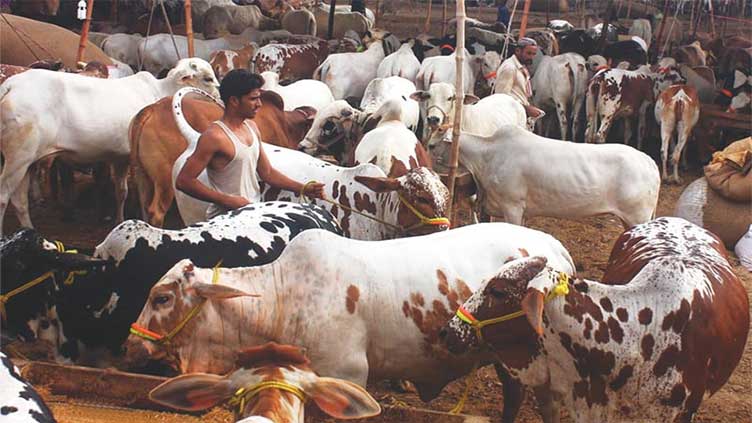Buyers struggle with high prices for animals as Eid nears

Pakistan
Those who show off are the real culprits for causing artificial price hike in cattle markets
By Arshad Shafiq
Slaughtering an animal on Eidul Azha is an important feature of the festival. On every Eid, it has become a challenge to purchase an animal at a reasonable price, particularly for those having a modest source of income, but at the same it is a fun for those having enough money, no matter it is from rightful or wrongful sources. The costlier the animal they buy, the greater they boast of it.
BOASTFULNESS AND ARTIFICIAL PRICE HIKE
Those who show off are the real culprits for causing artificial price hike in cattle markets, and ultimately keeping majority of buyers at bay from purchasing sacrificial animals.
‘I believe social media influencers make the matter worse. They reach cattle markets and interview sellers, who tell them 100 times higher prices of their animals and this price circulate in social media, impacting intended buyers. I think vloggers for their rating create hype about prices of animals, said a buyer while talking to Dunya News at Shahpur Kanjra.
PRICE COMPARISON WITH PREVIOUS
I went to Bahawalpur for buying sacrificial animals, hoping to get them at reasonable price. But I did not find a noticeable difference between the prices in Lahore and Bahawalpur. Thirty per cent prices are higher than the prices of last year, a buyer told Dunya News.
.jpg)
WAITING FOR FALLING OF PRICES
Eid is just around the corner, but no rush of buyers is witnessed in cattle markets. People want to sacrifice animals, but high prices, which I believe artificial ones, keep them away from this obligation. It seems they are waiting for falling of prices, which sometimes happen a day before Eid.
BIG ANIMAL TREND
The trend of slaughtering big animals is increasing. Seven people can share in a big animal such as cow or camel. In such way, they afford giving sacrifice of an animal otherwise it is not easy, particularly for those having a scanty source of income. A 120-kg cow carries approximately Rs200,000 and a goat of 15-kg carries Rs50,000. A seminary or mosque is taking Rs30,000 to Rs35,000 for a sacrifice from a cow, which is a great relief for a man with low income.
BUTCHERS' RATES
Local butchers cash in on the event by charging high prices for cutting animals. A butcher charges Rs25,000 to Rs30,000 for cutting a normal size cow. Similarly, for cutting a goat, they are charge Rs4,000 to Rs6,000. Butchers coming from small cities and villages demand comparatively less money, ending the monopoly of local butchers. On first day of Eid, they agree Rs10,000 to Rs12,000 for cutting a normal size animal. In day two and three, their prices come down gradually.
BURNING TROTTERS, HEADS
Though the Punjab government has disallowed burning trotters and heads in the open, this activity continues on all Eid days. People feel convenient going roadsides stalls set up for burning trotters and heads. Similarly, machines for minced meat are also fixed on three Eid days.
CATTLE MARKETS AND SECURITY
The Punjab government has set up temporary cattle markets and deployed police for the protection of buyers and sellers. As man 4,000 officers and personnel are performing security duties at 230 markets across the province. ,
In Lahore, 1,000 police officers and soldiers deployed for security of 11 cattle markets in Lahore. Comprehensive measures have been taken for the security of traders and buyers of livestock markets.
Around 284 patrol teams including Dolphin Squad, Police Response Unit will conduct effective patrolling around cattle markets.
In Sheikhupura region, 200 officers and personnel have been deployed for security of 26 cattle markets, 600 officers and personnel deployed for security of 41 cattle markets in Gujranwala region.
More than 250 officers and personnel have been deployed for security of 15 cattle markets in Rawalpindi region, 200 officers and personnel for the security of 24 cattle markets in Sargodha region, over 600 officers and personnel deployed for 19 cattle markets in Faisalabad, 400 officers and personnel have been deployed for 26 cattle markets in Multan, 200 officers and personnel deployed for security of 11 cattle markets in Sahiwal, 300 officers and personnel deployed for security of 35 cattle markets in Bahawalpur and 200 officers and personnel for 22 cattle markets in DG Khan.


